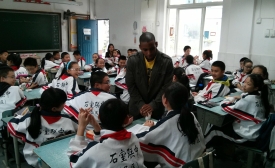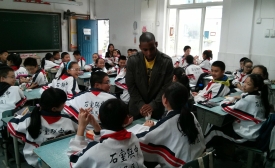united states
Liz Williams, executive director of the Southern Food and Beverage Museum, and Ryan Hughes, who will be the chef at the museum's restaurant Purloo, have traveled to Moscow to build good will through good eats, reports the Advocate. Williams and Hughes are part of a delegation funded by the U.S. State Department that also includes musicians Donald Harrison Jr., Keith Frank and the KIPP McDonogh 15 Middle School marching band.
A statement from the Public Affairs Section of the United States Embassy said under a concluded agreement, USAID and GIZ would make available funds and technical assistance to PAC for the implementation of capacity building activities, advisory services, public hearings, and peer learning with public accounts committees of other West African countries.
The US is considering downgrading Thailand to a human trafficking blacklist, following revelations in the Guardian that slaves are being used in the production of prawns sold in leading American, British and European supermarkets. Washington will directly address allegations of human trafficking in Thailand's trade in prawns – known in the US as shrimp – in an imminent report that could result in economic sanctions against Bangkok.
Argentina, the United States and Iran appear to be the most disliked World Cup teams. Brazilian fans enter the World Cup as the most confident, though Argentines and Spaniards aren’t far behind in their home-country optimism. And fans across many countries agree that the Brazilians play the most attractive form of soccer. These are among the results from a study of people in 19 countries conducted by YouGov, the online survey firm, in collaboration with The Upshot.
While the international outcry is gratifying in its endorsement of human rights and its outrage at the Islamic jihad and Sharia law, hashtag diplomacy has distinct limitations; it may serve as a starting point provided it doesn’t merely fade away after serving only to vent emotion, and it is no substitute for action.
High street giant Gap is to become the first American retailer to source garments made in Myanmar, the US embassy in Yangon said, over a decade after sanctions against the former junta slashed the country's textile industry.

By Di Wu1








